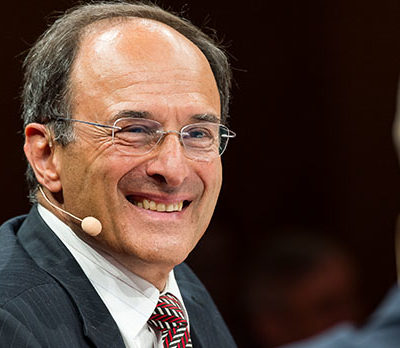Dennis Snower
Professor Dennis Snower is president of the Global Solutions Initiative, Director of “Social Economic Transformation” at The New Institute, and Professorial Fellow at the Institute for New Economic Thinking, Oxford University and a non-resident Fellow at the Brookings Institute. At the centre of his thinking stands the need to “recouple” our economies, reconnect them to a sense of shared purpose, of the common good. Here we share his ideas on what a new paradigm might look like in order to achieve true prosperity.
When did you start questioning economic orthodoxies?
When I entered the economics profession, I wanted to do good for society. I focused on the plight of the long-term unemployed and reforming the welfare state to provide more equity and care for people within a standard economic system. And I worked on the insider-outsider-theory – insiders are protected by labor turnover costs and use this protection to advance their own ends, which may under certain circumstances be harmful for the outsiders who don’t have this protection. The point is that many of inequities are inefficient.
What made you rethink the system?
The more interesting set of developments happened in my private life. Back in 1980, when I met the person who was to become my wife, on our first date she asked what I do . And I waxed lyrical for long time. She listened to all of this and said: what nonsense, human beings are not like that! She was then a nurse, studying to become a nurse tutor. It took me about 25 years to understand that she was right in a very fundamental way.
How did you come to that realization?
My wife became a psychotherapist, and I went along for the ride. I learned a lot about psychology and later on also about neuroscience. One thing that became increasingly clear was that the things that are important in economics – consumption, income – are not the things that I myself would consider the most important things in my life. I realized that something is terribly wrong here.
It was a slow learning curve.
It took me decades to understand that we require a new economic paradigm to see the world in a completely new way – where interpersonal interaction and social relations with other people are the primary source of economic activity. Economies are embedded in societies, not the other way around.
Why was that so hard to see?
Economists have defined their field in a way that makes it completely independent of other social sciences. You’ve got the idea of a circular flow of income – consumers and firms and government goods and services flow between them and money flows in the opposite direction. The economy seems to be self-sufficient – when the environmental movement started, they said, oh, okay, we have waste that goes out here and resources that come in here, but it’s a tweak of the circular flow.
The climate emergency is a factor concerning collective needs. How can we address this?
Climate change is a problem of the global commons. We are all on the same boat, and people from different countries and cultures need to work together in order to achieve a commonly accepted outcome. This requires work at many different levels in multilateral institutions, global institutions – often though, the focus is primarily on top-down edicts. The challenge is that everybody should feel that they have a stake in the game, and that they know how to contribute to something that is beyond themselves, that we act as part of a collective.
People need to feel like they are part of a story.
People need a couple of things. They need a paradigm – a set of ideas that coheres with one another – that helps you make sense of the world and underpins your decision-making processes. They need narratives or stories to identify causal relations and motivate you to activate your moral sense and tell you how your behaviour fits into the broader social structure. And they need mindsets, psychological attributes that can be generated by narratives and enable you to deal with certain challenges.
What is the basis for this new paradigm?
I just finished a paper on this with David Sloan Wilson – essentially a Darwinian paradigm applied to cultural evolution: variation, selection, and replication as the basis for innovation. We need to be aware that decision-making takes place at these different levels. As for the economy, it is important that the variation that takes place is not just probabilistic – you can’t foretell what will happen. We live in times of radical uncertainty. Economists have spent virtually no time thinking about this.
How does the war in Ukraine influence all of this?
The war in the Ukraine is a blatant departure from global cooperation to address global problems. Russia’s invasion of the Ukraine is based on zero-sum thinking: if I win, you lose. Most global problems require positive-sum thinking: either we all win or we all lose. Even in wartime, we must aim to find narratives that lead to positive-sum thinking.
This interview first appeared in an article called “The Human Scale: Dennis Snower on True Prosperity” published by The New Institute where Dennis is Program Director on the “Social Economic Transformation”.


